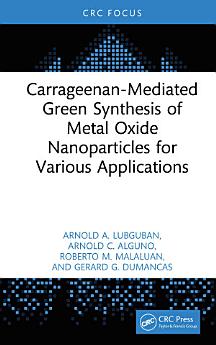Carrageenan-Mediated Green Synthesis of Metal Oxide Nanoparticles for Various Applications
About this ebook
- Uniquely focuses on the carrageenan-mediated approach to metal oxide nanoparticle synthesis
- Details the mechanisms specific to metal oxide nanoparticle synthesis and the relevance of carrageenan in nanoparticle enhancement (through doping)
- Covers the scalability and reproducibility of this emerging approach to bridge research and industrial production
This book serves as a primer for researchers and advanced students in materials science, chemistry, and chemical engineering to aid them in connecting their existing knowledge with the related peer-reviewed literature.
About the author
Arnold A. Lubguban currently holds an appointment as a professor and senior researcher at the Mindanao State University – Iligan Institute of Technology’s (MSU-IIT) in the Philippines. Before joining MSU-IIT in 2015, he had a short-term Balik-Scientist stint with the Philippines’ Department of Science and Technology (DOST) in 2014, giving lectures and training on bio-based polymer processing to academe and local industries. He received his B.S. in 1999 at the University of the Philippines – Los Baños (UPLB) and the University of Missouri’s MS and Ph.D. programs in chemical engineering in 2005 and 2009, respectively. He did a postdoc in industrial polymer processing in 2009 at the Ohio State University, focusing on biomass conversion into polyols and polyurethanes. He led several research programs and project leadership under the USAID-STRIDE and DOST-PCIEERD on processing sustainable polymers for industrial applications.
Arnold C. Alguno is a Professor in the Department of Materials and Resources Engineering and Technology at Mindanao State University - Iligan Institute of Technology, Philippines. He works on semiconductor physics; solar cell technology; quantum dots; sensor technology; nanotechnology; and advanced functional materials. Dr. Alguno received his BS in Electrical Engineering at Saint Joseph Institute of Technology, Butuan City and Science Doctorate in Physics and post-doctoral fellow at Tohoku University in Japan. His research area primarily covers the synthesis and characterization of nanomaterials and polymeric materials, contributing to technological advancements in material science and nanotechnology.
Roberto M. Malaluan was born in San Jose, Batangas, Philippines, and attended the Mindanao State University - Marawi, receiving a B.S. in 1983. He worked as an engineering instructor at Mindanao State University – Iligan Institute of Technology (MSU-IIT) for several years before attending Tohoku University in Sendai, Japan, where he received his Ph.D. under the guidance of Kunio Arai in 1995. He became a full professor of chemical engineering at MSU-IIT in 2004. He led several project leadership positions on supercritical carbon dioxide extraction of selected natural products and indigenous species for drug discovery and industrial applications under the Philippines’ Department of Agriculture (DA) and the Department of Science and Technology (DOST). He works as a senior faculty member doing instruction and research on sustainable polymers.
Gerard G. Dumancas is an Associate Dean of Research and Program Innovation (Honors College), Professor of Chemistry at North Carolina Agricultural and Technical State University, and the Director of the NSF Robert Noyce Teacher Scholarship Program at the University of Scranton in Scranton, Pa. He received his BS in Chemistry from the University of the Philippines in 2005 and his Ph.D. in Analytical Chemistry (Chemometrics) from Oklahoma State University in 2012. He completed his postdoctoral training at the Oklahoma Medical Research Foundation in the area of statistical genetics and bioinformatics. His research has been recognized by the American Oil Chemists’ Society, the Society for Laboratory Automation and Screening, the NSF Noyce Scholarship Program, the NSF S-STEM Program, and the LSU LIFT2. He was previously named as an NSF Program to Empower Partnerships with Industry Fellow as well as a Visiting Scientist of the Department of Energy’s Joint Bioenergy Institute and the National Renewable Energy Laboratory.





